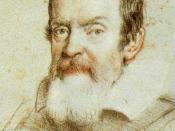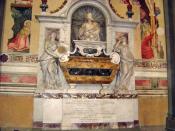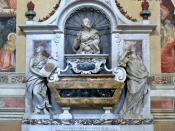The New Science Versus the Old Faith
During the 18th century, the age of Enlightenment, traditional thought patterns about the world were beginning to be challenged by scientific discoveries. Both Galileo and Descartes believed that one could believe in the teaching of the Bible and simultaneously accept the findings and conclusions of modern science. Galileo is credited for saying, "I do not feel obliged to believe that the same God who endowed us with sense, reason, and intellect has intended us to forgo their use." He strongly believed that we should not deny the things that God has bestowed upon us because they allow us to learn more about the world in which we live. Descartes, who is regarded as the founder of modern Western philosophy, did not anticipate any conflict between science and religion, but recognize that our physical realities might deceive us. The Letter to Queen Christina was Galileo's attempt to resolve the tension between religion and science; his letter tried to open the minds of people to new findings.
It also examined the true meaning of the scripture and then correctly interprets it.
Church officials were unwilling to except new findings because of their own self-pride and fear. Galileo accused them of, "showing a greater fondness for their own opinions than for the truth, they sought to deny and disprove the new things which, if they had cared to look for themselves, their own sense would have demonstrated to them" (Galileo 1). Galileo brought to light the idea that the laws the Church held in high esteem could be wrong. The church's unwillingness to except the new ideas could be compared to a game of dominos. If one domino falls they all fall. If the church opened themselves up to one new idea they would have...


